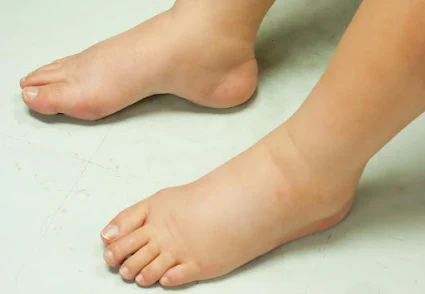7 Reasons Why Your Feet are Swollen: Swollen Feet Causes
Edema can be the result of medication, pregnancy or an underlying disease — often congestive heart failure, kidney disease or cirrhosis of the liver.
Taking medication to remove excess fluid and reducing the amount of salt in your food often relieves edema. When edema is a sign of an underlying disease, the disease itself requires separate treatment.
It’s not always clear why it happens, but some health conditions can make it more likely.
You might notice it after a long airplane flight or if you stand for hours at a time, and some women have it around their monthly period.
It usually goes away on its own, but sometimes it can be a sign of a health problem like low protein levels, heart failure, or kidney or liver disease.
Why Are My Feet Swollen?
Below are some reasons why your feet my swell:
1. INJURY
Your foot and ankle will likely swell as blood rushes to the area to help heal it.
See your doctor if it hurts a lot, you can’t put weight on it, or it doesn’t look right.
ALSO READ: 7 Common Reasons Why Your Face Looks So Swollen
2. PREGNANCY
It can be worse at the end of the day or after standing for a long time. It’s not usually a sign of a problem for mother or baby, but it can be uncomfortable.
It starts around 20 weeks into a pregnancy and is linked to high blood pressure.
One treatment for this is called pneumatic compression. You wear a sleeve over the affected areas, and air is pumped into it every so often to put pressure there and help move fluid away. Exercises, massage, and compression sleeves or socks may help, too.
These valves can get damaged as you get older or if you stand or sit for long periods of time.
If your blood doesn’t return to your heart the way it should, it can collect in your legs and feet and cause swelling.
ALSO READ: What Are The Signs Of Poor Circulation?
If your blood isn’t flowing well in the right direction, it can back up in your legs and feet and cause swelling.
With heart failure, it can be uncomfortable to lie down flat, your heart may beat faster or in an unusual rhythm, and you might have a hard time catching your breath.
Get medical help right away if you notice these signs.
READ MORE: 5 Natural Heart Failure Solutions
If they aren’t working right -- because of a condition like diabetes or high blood pressure -- too much salt (sodium) can be left in your blood.
That makes your body hold on to more water than it should. Gravity pulls the water down, and your feet and ankles can swell.
READ MORE: 11 Foods to Avoid If You Have Bad Kidneys
That can cause scar tissue to replace healthy tissue, and your liver can stop working like it should.
If that happens, too much fluid can pool in your belly, legs, and feet, making them swell. (Six (6) Common Lifestyles That Damage The Liver)
It’s most useful for sprains and broken bones, but it can help if your feet are swollen for other reasons, too
. If you rest and put your feet up (elevate them), fluid will flow away from your feet.
Ice makes blood vessels narrower -- limiting blood flow -- and helps with pain.
Special extra-tight socks called compression socks, or wraps around your feet, can help push fluid away from your feet.
Anything that moves your knees and flexes your ankles can help.
Other medications called diuretics can ease swelling -- they help your body get rid of fluid by making you pee more often.
Always talk to your doctor before changing or stopping your meds.
Foods high in this mineral include oatmeal, bananas, almonds,
Talk to your doctor before taking a supplement -- it can cause problems if you have a kidney or heart condition, or if you take medicine for other conditions.
These could be signs of fluid or a blood clot in your lungs.
See your doctor if:
You have pain and swelling that doesn’t go away.













Nice contents